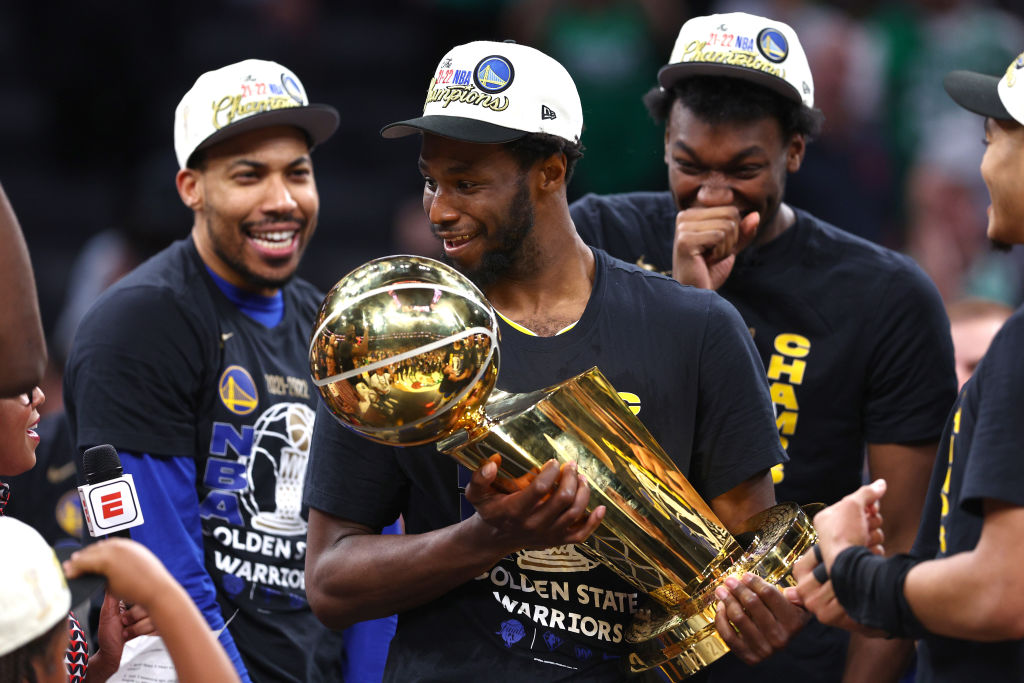During what is the apogee of Andrew Wiggins's professional life, I am dogged by two slightly rude thoughts about the Warriors forward.
The first is that Wiggins's performance in these NBA Finals—hailed as the long-awaited application of his many gifts, and a redemption of past failures—is still a roughly 65th-percentile basketball outcome for anyone lucky enough to run, jump, and be shaped like Andrew Wiggins. While I'm happy for him, I'm also forced to observe that he is 6-foot-8 and an outlier athlete within the most athletic pool of people to walk and dunk upon this good Earth. That he's making it work is more a relief than it is a revelation.
The second rude thought is that Wiggins has set a sterling example for underperformers in any industry: Find a way to get shifted into an easier role and you'll look brilliant. You might discover what your actual strengths are, and how they are different from what everyone else believed they were. You might even find yourself just a couple of bricked Steph Curry threes away from replacing teammate Andre Iguodala as history's funniest Finals MVP.
Wiggins has flourished now that he's no longer carrying the burdens put on an on-ball creator. He can bring his physicality to bear on more straightforward goals, like staying in front of his man or dunking with an open lane. None of his old demons can hurt him in California. Bad at making tough shots? Simply slot yourself next to two of the greatest shooters ever, and stumble into easy shots. Trouble making canny decisions in a half-court offense? Land on a team fueled by the aggregate wisdom of many good decisions, rather than the transcendent judgment of any one guy. No awareness or motor to help your team's defense? Play alongside Draymond Green and see your responsibilities simplified, even as the barking in your ear is amplified. Wiggins's success is less a matter of honing discrete new skills as it is getting shipped to one of the healthiest environments in the NBA and buying all the way in—and he surely deserves credit for buying in, given how many players let their pride and pedigree get in the way of productive seasons in diminished roles. (If there exists a hypnotist in Southern California who could trick Russell Westbrook into performing any recognizable basketball-playing motion when the basketball is not in his hands, the Lakers might have tasted the playoffs.)
This seemed to be the precise series where Wiggins realized he could impose his body on the game even when his shot wasn't falling. That's how you see "Finals MVP" bandied about a guy who averaged 18 points a game, on true shooting just below 52 percent, while failing to crack 30 percent from three. Then there's the psychedelic bit: a series-high 8.8 rebounds. Suddenly there was Andrew Wiggins, a career average of 4.5 boards, hauling down 16 rebounds in Game 4 and 13 in Game 5, compensating for Golden State's physical disadvantages against an oversized and musclebound Boston squad.
Wiggins made a big postseason leap not just from past seasons, but from his regular-season numbers: His offensive rebounding rate hopped from 4.1 percent to 8.1 percent, while on defense he went from 10.9 percent to 15.8 percent. When asked how he did it, he said, "I want to win." This is far from the default state for Wiggins, so hopefully the Warriors can keep convincing him that his hops are best spent dominating the glass.
Wiggins says NO 🚫#NBAFinals presented by @YouTubeTV 🏆 pic.twitter.com/eibk5Zvvi5
— NBA (@NBA) June 17, 2022
The more familiar but equally important Wiggins contribution was his defense. Every gifted athlete who doesn't pan out as an on-ball guy should take this as a blueprint. He may not have the natural team defense instincts of Green or Marcus Smart, but Wiggins is still an astounding mover in space. It's even better and cleaner when he doesn't have to think about what he's going to do with the basketball. He's slippery enough to navigate screens, strong enough to absorb shoulders to the chest, speedy enough to stunt at would-be shooters or drivers before recovering to his man, and springy enough to erase a shot even when a hair late. Jayson Tatum, already taxed by sheer minutes and a shoulder injury, was flummoxed by Wiggins's constant harassment. Wiggins illustrated the maximum value of 35 minutes of nasty, dedicated wing defense over the course of a postseason run.
In the past, the Warriors benefited from some comically underpriced contracts; now they're extracting every bit of value from a perceived albatross. They changed this guy's damn life.






